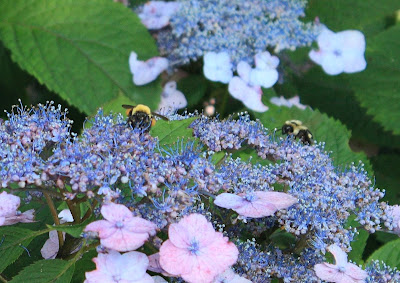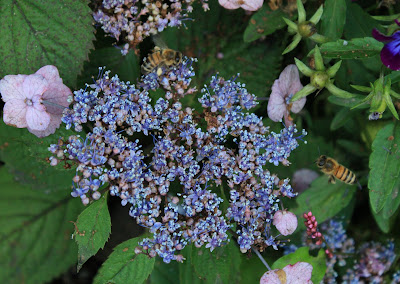The rain may have taken a toll on our collective morale here in Northeast, but a weekend walk through the wilds of northwestern Manhattan convinced me that Ma Nature didn't mind the wet weather too much. It is incredible how the landscape of Fort Tryon has changed. The skies have (hopefully) cleared, revealing lush landscapes and burgeoning new blossoms. The pollinators, like us humans, seem elated at summer's belated glory in the park's unbelievably lovely Heather Garden. Below, two adorable bumblebees indulge in the sweet nectar of what seems to be wild hydrangea.

Honeybees, too, get in on the action. Note the pollen pants:
 The complex relationships that exist in nature are innumerable. The bumblebee, however, happens to star in one of the most famous Darwinian examples of unlikely correlations: more bumblebees=more cats(!) The equation goes like this:
The complex relationships that exist in nature are innumerable. The bumblebee, however, happens to star in one of the most famous Darwinian examples of unlikely correlations: more bumblebees=more cats(!) The equation goes like this:
More pants! These girls are working hard!
The bumblebee (called "humblebee" in England... how quaint!) works alongside the honeybee in pollinating endeavors; this weekend, the hydrangeas seemed particularly appealing to both types of buzzers.
 The complex relationships that exist in nature are innumerable. The bumblebee, however, happens to star in one of the most famous Darwinian examples of unlikely correlations: more bumblebees=more cats(!) The equation goes like this:
The complex relationships that exist in nature are innumerable. The bumblebee, however, happens to star in one of the most famous Darwinian examples of unlikely correlations: more bumblebees=more cats(!) The equation goes like this:Bumblebees have long tongues. (Imagine a straw, rather than a human tongue.) Plus, they are fat. Their heft enables them to wiggle into the prudish red clover, while their long tongues extract the blossom's nectar.
The amount of red clover in an area depends on the number of bumblebees. Honeybees cannot pollinate red clover, as their bodies are not conducive to its shape, and their tongues are too short.
A favorite dish of the field mouse happens to be bumblebee comb, so the more bumblebee comb, the more field mice.
Feral cats love a good field mouse dinner, so where there are field mice, there are also cats.
To explicate summarily: Red clover depends on bumblebee pollination to survive, so where there is red clover, there are bumblebees; where there is bumblebee comb there are field mice, and where there are field mice, there are cats. Whoa!
I'm relieved to see that our city bees haven't starved to death because of the massive amounts of rain. Of course, my concern gives them little credit; they've been doing their thing for much longer than I've been doing mine. Still, the buzzing hydrangea shrubs ensure me, novice beekeeper and mere human, that Ma Nature knows what she's doing.







No comments:
Post a Comment